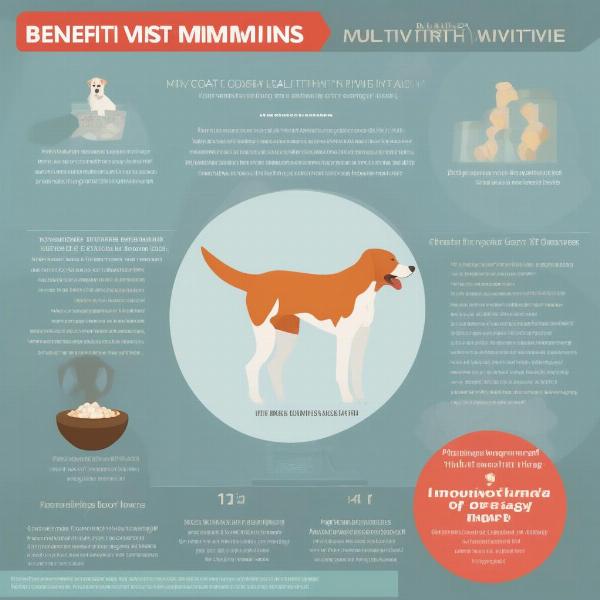Multi vitamins for dogs can play a crucial role in maintaining their overall health and well-being, but navigating the world of canine supplements can be overwhelming. This guide will explore the benefits, potential risks, and key considerations when choosing multivitamins for your furry friend. Understanding your dog’s specific needs is essential for making informed decisions about their nutritional supplementation.
Understanding the Need for Multi Vitamins for Dogs
Does your dog need a multivitamin? A complete and balanced diet should provide all the necessary nutrients. However, certain factors like age, breed, health conditions, and even dietary restrictions can create nutritional gaps.  Benefits of Multivitamins for Dogs For instance, puppies and senior dogs often have different nutritional requirements compared to adult dogs. Similarly, dogs with allergies or digestive sensitivities may benefit from targeted supplementation. Always consult your veterinarian before starting your dog on any new supplement, including multivitamins.
Benefits of Multivitamins for Dogs For instance, puppies and senior dogs often have different nutritional requirements compared to adult dogs. Similarly, dogs with allergies or digestive sensitivities may benefit from targeted supplementation. Always consult your veterinarian before starting your dog on any new supplement, including multivitamins.
Choosing the Right Multi Vitamin
Not all multivitamins are created equal. The right multivitamin for your dog will depend on their individual needs. Factors to consider include age, breed, size, activity level, and any existing health conditions. best multivitamins for dogs uk offers a curated selection based on specific needs and breeds. Look for multivitamins that are formulated by veterinary nutritionists and are AAFCO (Association of American Feed Control Officials) compliant. This ensures that the product meets specific nutritional standards.
Key Nutrients to Look For
When selecting a multivitamin, look for essential nutrients like vitamins A, D, E, and K, as well as B vitamins, and minerals such as calcium, phosphorus, and zinc. These nutrients play vital roles in supporting various bodily functions, from immune health to bone development. Avoid multivitamins containing artificial colors, flavors, or sweeteners, as these can be harmful to dogs.
Potential Risks and Side Effects of Multi Vitamins for Dogs
While multivitamins can be beneficial, it’s important to be aware of potential risks. Over-supplementation can lead to toxicity, particularly with fat-soluble vitamins like A, D, E, and K. Always follow the recommended dosage instructions on the product label and consult with your veterinarian if you have any concerns.
Signs of Vitamin Toxicity in Dogs
Symptoms of vitamin toxicity can vary depending on the specific vitamin involved. Common signs include vomiting, diarrhea, loss of appetite, increased thirst and urination, weakness, and lethargy. If you suspect your dog has ingested too many vitamins, contact your veterinarian immediately.
Incorporating Multi Vitamins into Your Dog’s Diet
Once you’ve chosen the right multivitamin, introducing it gradually can help prevent digestive upset. Start with a smaller dose than recommended and gradually increase to the full amount over several days. dog multivitamin provides detailed guidance on integrating supplements seamlessly into your dog’s diet. You can mix the multivitamin with your dog’s food or offer it as a treat. Some multivitamins come in chewable forms that dogs find palatable.
When to Consult a Veterinarian
Always consult your veterinarian before giving your dog any new supplements, especially if they have underlying health conditions or are taking other medications. They can assess your dog’s individual needs and recommend the appropriate type and dosage of multivitamins. vitality for dogs provides resources and articles related to dog health and wellness. Your veterinarian can also help you monitor for any potential side effects.
Conclusion
Multivitamins can be a valuable addition to a dog’s diet, particularly in cases of nutritional deficiencies or specific health needs. However, careful consideration and veterinary guidance are crucial. By understanding the benefits, risks, and key factors involved, you can make informed decisions about incorporating multi vitamins for dogs into your pet’s care routine.
FAQ
- Do all dogs need multivitamins? Not necessarily. A balanced diet should provide all the necessary nutrients. However, certain dogs may benefit from supplementation.
- What are the signs of vitamin toxicity in dogs? Signs can include vomiting, diarrhea, loss of appetite, and lethargy.
- How do I choose the right multivitamin for my dog? Consider factors like age, breed, size, and health conditions. Consult your veterinarian for personalized recommendations.
- Can I give my dog human multivitamins? No, human multivitamins can be toxic to dogs.
- What should I do if I suspect my dog has overdosed on vitamins? Contact your veterinarian immediately.
- Are there any alternatives to multivitamins? A balanced diet is the best source of nutrients. Your veterinarian may recommend specific food changes or other supplements.
- How do I store dog multivitamins? Store in a cool, dry place away from direct sunlight.
ILM Dog
ILM Dog (ILM Dog) is your global resource for expert dog care advice. We offer comprehensive guides on Breed Selection, Dog Health, Training, Nutrition, Grooming, and much more. From puppies to seniors, we’re committed to providing practical, reliable information for dog owners worldwide. Our expertise in canine nutrition ensures you’ll find the best advice tailored to your dog’s needs. Contact us for personalized guidance: [email protected] | +44 20-3965-8624.